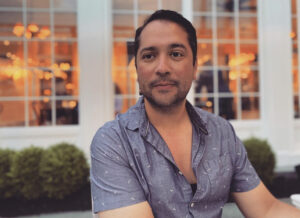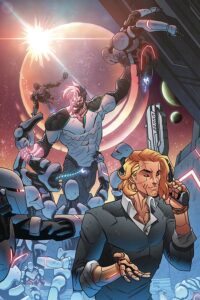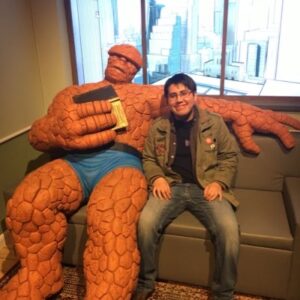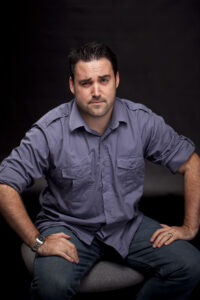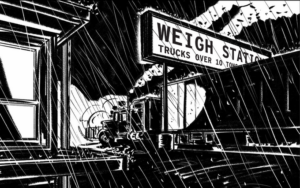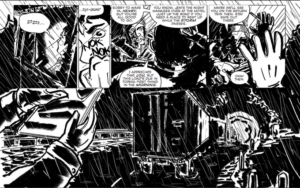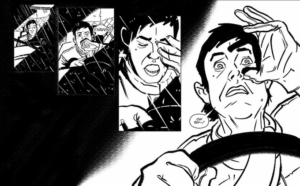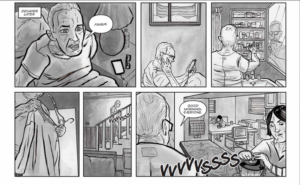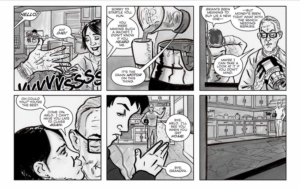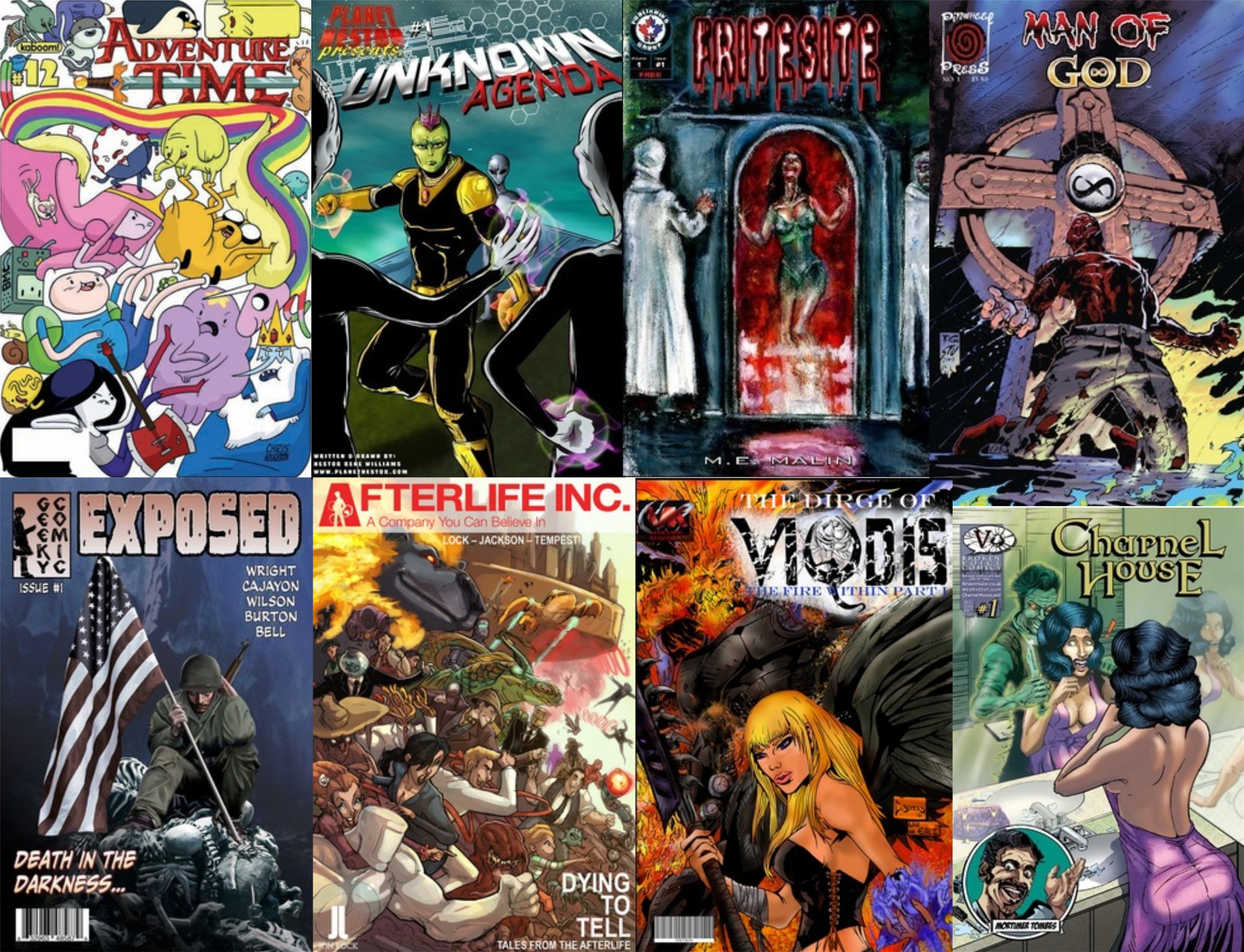True Crime Podcasts, Kickstarters, a Fog Line with a secret that needs to be left alone, and the 4 guys behind it all! So come on down for this interview featuring Mario Candelaria, Hernan Guarderas, Matt Krotzer, and Andy Michael!
1. Hello there, and welcome to the Mind Meld here at IndieComiX! For those who may not be aware of you guys and what it is you each do, could you tell us a bit about yourselves?
MC: Hey. My name is Mario Candelaria and I am a writer and stand up comedian based out of the Philadelphia suburbs. I’ve also dabbled in some acting as an extra in Transformers 2 and HBO’s Bored to Death.
HG: Hi! Hernán Guarderas here! Writer/Editor based out of Seattle who wrapped up edits for Crash & Troy over at Action Lab! Now, editing Fog Line and also re-watching Transformers 2 to find Mario’s cameo?!
MC: Look in the “Paris” scene which is clearly Philadelphia town hall. I am one of the people fleeing the Decepticon’s search for Sam’s parents. I had chin length hair, a black denim jacket, a black and white horizontal striped shirt, and a scarf. I couldn’t been more stereotypical if they gave me a baguette, smoking a cigarette at an outdoor Cafe.
Fun fact, I tripped and fell right in front of Michael Bay and he helped me to my feet.
MK: Hi! I’m Matt Krotzer, and I’m a comic book letterer and graphic designer from the Central PA region, as well as an avid video gamer and D&D player/DM.
AM: Hi! My name is Andy Michael and I am a comic artist living in Los Angeles. I’m originally from the Midwest, but I’ve been out here for about a decade now. I love movies and comics, and I like to tinker with arcade junk.
2. Midwest Pride represent! You’re all respectively involved in a current on going Kickstarter project called ‘Fog Line‘ with Mario as the writer, how did that come about for each of you?
HG: Mario and I were in a writer’s group together and read Fog Line! Loved it and all its ambition. A few months later, Mario asked me on as editor and I jumped at the chance!
AM: I’d worked with Mario before on a short in an anthology he put together. Since then, we’d share the occasional work-in-progress with each other. He sent me a draft of Fog Line to check out, and I really loved it. The hook was just so good, and I love to see characters stew in tense situations. I didn’t anticipate that he would ask me to draw it, but I kinda hoped that he would! And he did! And we started collaborating on it.
MK: Mario and I have known each other for years, and worked together on several stories. I jumped at the chance to work on Fog Line when I saw how excited he was about it.
3. This is for Mario, what inspired you to get the idea for Fog Line?
MC: The actual spark of the idea is a mystery to me. I was at the dinner table this past thanksgiving chit chatting with a handful of family when it came to me.
Ideas often come to me out of nowhere and I forget way too many than I’d like to admit, so I immediately excused myself and began writing down what I could so I would not lose it this time.
It’s easier for me to point out influences from when I started actually working on the story. Tom King for pacing, Coen Brothers for that Everyman quiet desperation, just times in life when I did something wrong and just waited to get caught.
4. Just how dark can readers expect Fog Line to get?
MC: Dark is a relative term for this story. While I do not feel things get grim per se, it is wrought with emotional turmoil as a man comes face to face with the consequences of his selfish actions. It’s a different type of dark that is just as haunting in many ways.
AM: There’s nothing too macabre. There isn’t much violence, either; this one is more into the consequences, shame, and panic that follow violence.
5. This one’s for Andy, for those who may not be familiar with what a Landscape Format is, could you tell us what that is?
AM: For those unfamiliar with the term, Landscape Format means that this book is more wide than it is tall, which is less common for comics. What it means for the storytelling is we have a slightly different set of tools we can use. In comics, space is time. We can do “longer” moments to really let things linger and it’s easier to do a sequence of very narrow panels to show panic or rush. You can totally do these things in a comic of any shape, but we’re able to cultivate a different feel in the format we chose and there are different panel layouts that work better in landscape. I was quite taken by Paco Roca’s approach to landscape comics in “The House“, and I’ve been dying to play in that space ever since I read it.
6. Why choose to go with no colors for Fog Line?
MC: Budgetary reasons, of course! But honestly we felt this was a story that was just as strong without color. In many ways the bleak tones add to the character building moments in a way that even muted colors could not. There’s also a lot of snow in this, a symbolic choice that was made in the world building.
AM: Black and White comics/photos/films were born out of technical limitations and remained prevalent due to financial constraints, right? But they have their own visual language that remains vital, and we still get to enjoy a lot of work where creators elect to use black and white. I think I’d choose to tell this story in black and white no matter what. My approach to ink wash really lends itself to quiet and intimate moments, too. Fog Line’s flashbacks are in stark black and white, and the present day is grey tones. Clarity is the primary reason for this choice, but we also get to use these structures to show how our main character views his choices and actions in the past, and how murky and uncertain he feels now. Color would give us different tools to establish clarity and tone, but I think the choices we’ve made in black and white are the best choices for this story.
7. What made the decision for Fog Line to ultimately be a Graphic Novel, rather than a mini-series?
MC: That’s a good question, and one I am glad you asked. We felt that the heart of the story worked best in it’s 36 pages. Adding any more would risk diluting the tale. It’s a case of too much cake just to fit a specific mold. But this isn’t even a full length graphic novel. It is to an OGN what a squall is to a blizzard.
AM: I think this story just works as a one-shot. I love to read single issues AND I love to read contained stories. I wish the industry had more one-shots. Gabriel Hardman put out The Belfry a couple of years ago and I absolutely loved it. I’d love to read more quick, killer books from top talent.
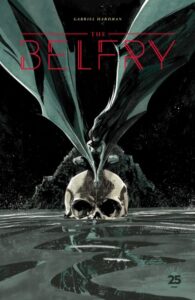 HG: A story like this needs to be self-contained. It helps to keep that tension burning on each page until the fuse touches the dynamite so to speak. Andy and Mario have done just that in the right format and length.
HG: A story like this needs to be self-contained. It helps to keep that tension burning on each page until the fuse touches the dynamite so to speak. Andy and Mario have done just that in the right format and length.
8. In the event the Kickstarter isn’t able to hit its goal by the end, what do you guys plan to do in the aftermath?
MC: Andy’s still working on the pages so I guess I’ll just go out of pocket. Writers are expected to be the payroll in comics these days anyway, so what’s a little debt between chums?
MK: I’ll probably get back to my plush lifestyle of jetsetting around the world, wild parties in Ibiza one night, red carpets in LA the next…
AM: While I am optimistic about the Kickstarter, this is a story that we’re going to tell no matter what.
HG: Glad to see Andy and Mario on on board regardless! I am optimistic about the Kickstarter. Think we’re doing great and people have responded well to it!
9. For each of you, where do you stand when it comes to Print vs. Digital?
MC: I’m very laissez faire about physical vs digital. I buy both. I enjoy both. I have over 1000 trades and omnibi that look great on the shelves and yet I am going to regret next time that I move. I also have an Ipad with Marvel Unlimited and the DC App that I take with me whenever we go away on an overnight trip that’s great for quick research and reference.
MK: I’ll always prefer print, because I like the experience of holding the book in my hand, turning the pages… but I also recognize that there’s a significant and growing audience that prefers a digital experience, and I’m cool with that, too.
AM: Personally, I strongly prefer to read print comics. I’m the son of a librarian, so I also enjoy the ritual of accessioning and storing them. That said, I’m running out of room so I think I’ll be grabbing more stuff digitally in the future. I think digital helps creators reach more readers and it’s certainly cheaper to distribute. I’m all for people buying and reading comics in whatever format gets them reading more comics!
HG: Print rules! I love its tangibility. Something about having it in my hands helps me focus better, but I’ve been enjoying the hell out of digital lately. For comics I can’t find or afford, I use Hoopla. For stories you just wouldn’t find from traditional pubs, I’ve been reading Webtoons and other webcomics!
10. For each of you personally, how has the Pandemic effected the 4 of you? And how do you feel things could have been handled differently?
MC: Day to day my life hasn’t changed on the surface. I still commute two miles to my office, I still go home for lunch and watch my shows during the day. My wife being home was a nice touch but she’s starting to commute back to her office and I already miss that time together I got accustomed to for the last fifteen months. I have an opinion or two on how things could have gone, but I try to focus on fixing things going forward rather than dwelling on where something outside of my control failed.
MK: The pandemic has been quite an experience. After 20 years, I lost my day job as a graphic designer, as our business shrank. I spent the entire school year as my daughter’s teacher for cyber school, and then finally made my transition to full time freelance design and lettering. I think that we could’ve saved hundreds of thousands of lives with a competent, focused response that addressed COVID as a legitimate threat. A strict lockdown for 6-8 weeks, with protocols to ensure the safety of essential workers, could have limited the spread and lessened the long-term economic impact.
AM: I try to focus on the positive things as we move forward. The big picture failures are just too disheartening and frustrating. My son was born at the end of 2019, so the silver lining for me has been more time at home with him. I was partially furloughed from my day-career at the start of the pandemic, which allowed me to draw a lot of comics (and also to panic). I ended up getting a much better day-career gig. Now I guess the goal is to get back to part time, but on purpose. I have to get a lot better before opportunities to do that start appearing though!
HG: Lost my day job at the beginning of the Pandemic, but luckily I found a gig at a school soon after, but had a ton of free time before September. Basically, spent my time working on future pitches and editing Crash & Troy at Action Lab.
OH! Also, my partner and I got a dog named Darby who we are so grateful and happy to have in our lives.
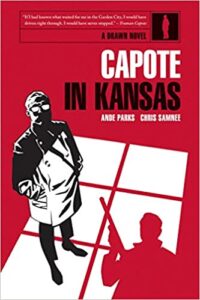 11. What are some True Crime related comics you guys would recommend?
11. What are some True Crime related comics you guys would recommend?
MC: Capote in Kansas for sure. 1000% if I am being honest. Torso was a hot title when I was younger.
AM: My Heroes Have Always Been Junkies was so phenomenal. I’m very late to the Brubaker/Phillips books, so I’m playing catch-up now. Selina’s Big Score by Darwyn Cooke is also a masterpiece. Fun, gorgeous, bittersweet.
HG: Seconding Torso! Insanely good True Crime comic. Also, recommend My Friend Dahmer and the Green River Killer: A True Detective Story!
12. As for my final question, what advice would you all give to those looking to get into the Industry?
MC: When I was twenty a big name told me to make it writing in some other field then leverage that to get into comics. That stuck with me for better or worse. I think part of that is true, but also it’s who you surround yourself with that helps as well. You can really go far with the right group of peers that are your pace cars who help one another out finding opportunities and don’t pull the ladders up from under them. Finding that last part is tricky since there’s so many opportunists who are your buds until they realise you can’t further their careers. TLDR: Diversify your mediums, forge good friendships, but beware of snakes.
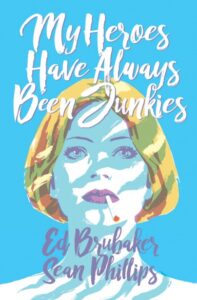 MK: Know your worth and value your work, but do so realistically. So many people are willing to accept ridiculously low rates for their work because they desperately want to get into making comics. At the same time, recognize that you might not be as good as you think, especially as you’re starting out. It’s a balancing act between securing a fair rate and ensuring you’re affordable for your skill level.
MK: Know your worth and value your work, but do so realistically. So many people are willing to accept ridiculously low rates for their work because they desperately want to get into making comics. At the same time, recognize that you might not be as good as you think, especially as you’re starting out. It’s a balancing act between securing a fair rate and ensuring you’re affordable for your skill level.
AM: I’m very much still trying to get in! The thing I really wish I understood when I was 10 years younger is that DONE is truly better than PERFECT. I spent a lot of time thinking that I had to be better before I was submitting stories or showing stories to people. But one cannot get better without finishing stories and showing them off. You really just have to start making comics. That’s it. Not when you’re good enough but right now.
HG: Honestly, be kind and get your stuff out there! It has been a process to figure out what “breaking in” means and being friendly without being opportunistic about it is a great way to build your own community within the industry. Most peeps in the comics community are ultra nice and open to giving others advice.
The other advice I would give is to finish things. Not everything will be perfect especially starting out, but it’s good to make sure you complete your stories. And if you can afford to do it, apply to internships at publishers!
Editor’s Note: Huge thanks to the four of you for taking part in this interview! Fog Line is currently at 5,511 dollars of its 7,000 dollar goal with 11 days to go. With your pledge’s help, Fog Line will surely be a success!


